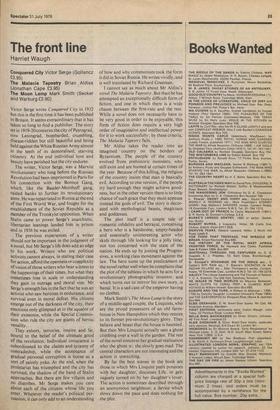The front line
Harriet Waugh
Conquered City Victor Serge (Gollancz £3.95) The Malacia Tapestry Brian Aldiss (Jonathan Cape £3.95) The Moon Lamp Mark Smith (Secker and Warburg £3.90) Victor Serge wrote Conquered City in 1932 but this is the first time it has been published in Britain. It seems extraordinary that it has taken so long to find a publisher. The story set in 1919-20 concerns the city of Petrograd, now Leningrad, bombarded, crumbling, disease-ridden but still beautiful and being held against the White Russian Army almost in the teeth of its demoralised, starving citizenry. At the end individual love and beauty have perished but the city endures.
The writer, Victor Serge, was a Marxist revolutionary who long before the Russian Revolution had been imprisoned in Paris for his connection with the Bonnot Gang, Which, like the Baader-Meinhoff gang, raided banks to further its revolutionary aims. He was repatriated to Russia at theend of the First World War, and fought for the establishment of the Soviet Republic as a member of the Trotskyist opposition. When Stalin came to power Serge's anarchistic, libertarian leanings landed him in prison and in 1936 he was exiled.
The previous experiences of a writer Should not be important in the judgment of a novel, but Mr Serge's life does add an edge to his work. Writers who are political activists cannot always, in stating their case for action, afford the openness or complexity of vision of those writers who bear witness to the happenings of their times, but what they sometimes lose in scale or understanding they gain in outrage and moral vim. Mr Serge's strength lies in the fact that he was an activist who saw heroism in endurance, and survival even in moral defeat. His citizens emerge out of the darkness of the city, their emotions only glimpsed at in the squalor of their existence, while the Special Commission who rule the city are giants of heroic venality.
They exhort, terrorise, inspire and lie, bound to the belief of the ultimate good of the revolution. Individual conscience is subordinated to the claims and tyranny of comradeship, while the acceptance of gradual personal corruption is borne as a sort of saintly yoke. At the end, when the Proletariat has triumphed and the city has survived, the shadow of the hand of Stalin approaches. But there are few villains and no diatribes. Mr Serge makes you care about each of the citizens whose life you enter. Whatever the reader's political persuasion, it Can only add to an understanding of how and why communism took the form it did in Soviet Russia. He writes vividly, and is well translated by Richard Greeman.
I cannot say as much about Mr Aldiss's novel The Malacia Tapestry. But then he has attempted an exceptionally difficult form of fiction, and one in which there is a wide chasm between the first-rate and the rest. While a novel does not necessarily have to be very good in order to be enjoyable, this form of fiction does require a very high order of imaginative and intellectual power for it to work successfully; by these criteria, The Malachi Tapestry fails.
Mr Aldiss takes the reader into an imagined country on the borders of Byzantium. The people of the country evolved from prehistoric monsters, who still exist and are hunted at certain times of the year. Because of this killing, the religion of the country insists that man is basically evil. According to one version, if the people try hard enough they might achieve goodness, but in the other version there is so little chance of such grace that they must appease instead the gods of evil. The story is decorated with mythological beasts, magicians and goddesses.
The plot itself is a simple tale of romantic infidelity and betrayal, concerning a hero who is a handsome, empty-headed and essentially uninteresting actor who skids through life looking for a jolly time, not too concerned with the state of the nation. He ends up by joining the Progressives, a working class movement against the law. The hero sums up the predicament of the novel rather well when he complains that the plot of the tableau in which he acts for a revolutionary photographic inventor, and which turns out to mirror his own story, is banal. It is a sad case of the emperor having no clothes.
Mark Smith's The Moon Lamp is the story of a middle-aged couple, the Linguists, who are the proud possessors of an old farmhouse in New Hampshire which they restore, to its former pre-revolutionary glory. They believe and boast that the house is haunted. But then Mrs Linguist actually sees a ghost climbing over a wall in the garden. The rest of the novel concerns her gradual realisation who the ghost is; she slowly goes mad. The central characters are not interestingand the action is unexciting.
By far the best scenes in the book are those in which Mrs Linguist peels potatoes with her daughter, discusses Life, or gets vaguely turned on by her daughter's lover. The action is sometimes described through an anonymous neighbour, a device which slows down the pace and does nothing for the plot.


































 Previous page
Previous page